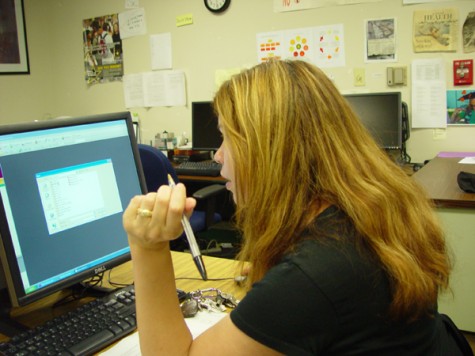Some students take two-hour bus rides to get to school, some decide that getting an education is more important than spending time with friends, and some make a decision to buy books over food.
For those staring at the choice of books over food, Food for Thought may offer some relief.
Food for Thought, now a program that receives more than $6,000 annually, mostly funded from contributions through payroll deductions of more than 50 faculty and staff members here at Glendale Community College, is designed to help students in emergency financial situations.
“It’s hard to feed the mind if the belly is empty,” said Jeannette Stirdivant, one of the founders and a payroll deduction participant in the program.
“Valerie Rhaney and Jeanette were noticing that a lot of students were coming in and they had so few resources that they were making a decision of ‘should I eat today or should I buy books?'” said Joy Cook, another founder and payroll deduction participant.
Qualifying students are awarded $1,000 in gift certificates from local markets. Depending on the funds raised as many as 15 students could receive the $1,000 grant.
Every year, hundreds of applications are turned in from students who are homeless, single mothers, single fathers, single females and single males. The applications are ranked by the Food for Thought committee according to the financial need of the student.
Cook’s most memorable story was of a student who was trying to go to school while she was taking care of her dying mother and father.
“‘I was able to buy toilet paper, bleach, detergent, and toothpaste,’ things that some may take for granted,” said Stirdivant, reading a thank you letter from a recipient.
“We saw the importance of it and took the idea to people and was supported by founding members: Valerie Rhaney, counselor at the center for students with disabilities; Vicki Washington, who was the associate dean of the EOPS; Pat Hurley, associate dean of financial aid; Yei Mei Wong, former instructor of culinary arts; and Mike Eberts, who is almost a founding member – he’s been in the program for about 10 years – and the ASGCC,” said Stirdivant.
Eberts, professor of mass communications and a Food for Thought committee member, raises about $700 to $1,000 during the fall and spring semesters through media-related field trips for his classes, in which television shows pay audience members to turn out.
Eberts finds it hard to rank the students on who needs the award since “they can all easily qualify.”
” ‘I appreciate having hope and to see my son eating fresh fruit and vegetables, it’s a blessing,'” said Stirdivant reading another thank you letter. “How can you not be thankful that you’re involved in a program like that?”
The program that began in 1995 with $25 food vouchers continues to help distressed students who now receive food vouchers on a monthly basis for one year.
Students that receive the award are “often single parents trying to take care of their kids,” said Stirdivant.
Students must be enrolled in a minimum of 6 units identified on their student educational plan, have successfully completed at least 12 units, maintain a grade point average of 2.0 or higher and have completed a financial aid file as required by the financial aid office.
Applications are now available in the EOPS office, center for students with disabilities, the financial aid office, the scholarship office, and the information desk with a deadline of Oct. 17 to be turned in at the center for students with disabilities on the second floor of the San Rafael Building.

